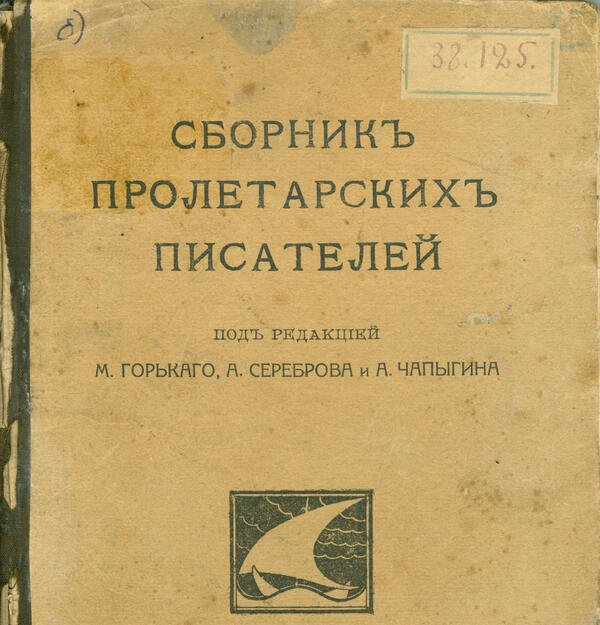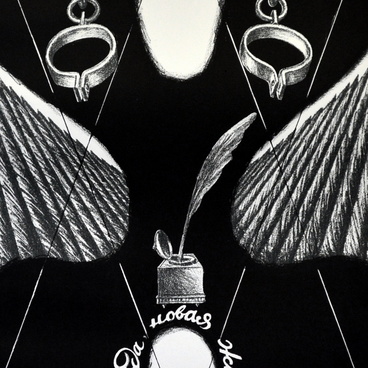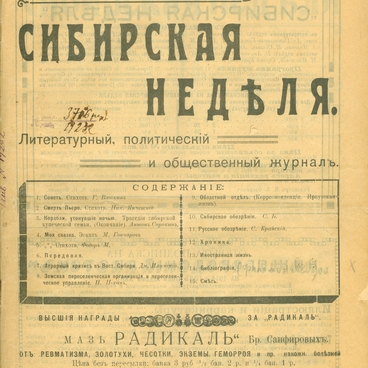Only two Proletarian Literature Anthologies were published: one in 1914 and another in 1917. The material printed in them was thoroughly selected and edited by Maxim Gorky. The second one featured some of the earliest Vsevolod Ivanov’s pieces, poems by Alexander Shiryayevets, MikhaIl Artamonov, Pyotr Bunakov, and Ivan LogInov, and prose works by MikhaIl Chernokov, Nikolai Rybatsky, and MikhaIl Radlov.
Sergey Yesenin wrote on the anthology in a critique “On Proletarian Literature Anthologies”, “Proletarian Literature Anthology shone its dim early light so brightly into readers' hearts like a candle sheltered from the wind carefully by the hands of the yearning. <…> There is the sacred silence of wise men and seers, the virtuous cluttering of symbolists, but also the dumbness and dense stuttering. I don”t want to be rude but the ones who brought flowers and spring into the garden of granite and metal at the call of factory sirens are rather the latter. Apart from the sirens, there still is a chant and a neat verse. During ancient Dagon celebrations, songmakers competed against each other just like swordsmen or spearmen. However, contemporary poets and thinkers show no wit or grace in their patterns. They are primarily trotters of the beaten trails, detractors of the obsolete not capable to build anything new. <…> Here, we have vague patterns at all, just cluttered rubber stamps and dead flowers. However, some, Kondraty Khudyakov in particular, do have patterns that are nice and blooming like the ones of many modern masters <…> Alas, there is nothing but patterns. Neither Khudyakov has the spark of hope to light the sky-high open fire. All he did was draw the vague outline of what is called verbal prowess <…> This is why Mikhail Gerasimov who stands out from the entire Proletarian group by loudly and proudly from the depth of his lungs singing his song of no outward Proletarian but of the one which is “I” under the flesh, a wise and genuine worker <…> Sadly, Gerasimov is represented very poorly in this last anthology <…> Prose fiction included in the anthologies, alas, deserves little attention. Novella “Freemen”. An obscure and unshaped compilation of Potekhin’s and Zasodimsky’s techniques. Short stories are a cross between lyrical drafts and jokes from a rough and unattractive life where everything is in the wrong place and humans and their things bear the same kind of light. Proletarian prose has not shaped yet. Neither has poetry. To sum up the compact thoughts of the authors from the anthology, we must say that their way isn’t clear yet. By now, only the initial landmarks have been determined…’
Sergey Yesenin wrote on the anthology in a critique “On Proletarian Literature Anthologies”, “Proletarian Literature Anthology shone its dim early light so brightly into readers' hearts like a candle sheltered from the wind carefully by the hands of the yearning. <…> There is the sacred silence of wise men and seers, the virtuous cluttering of symbolists, but also the dumbness and dense stuttering. I don”t want to be rude but the ones who brought flowers and spring into the garden of granite and metal at the call of factory sirens are rather the latter. Apart from the sirens, there still is a chant and a neat verse. During ancient Dagon celebrations, songmakers competed against each other just like swordsmen or spearmen. However, contemporary poets and thinkers show no wit or grace in their patterns. They are primarily trotters of the beaten trails, detractors of the obsolete not capable to build anything new. <…> Here, we have vague patterns at all, just cluttered rubber stamps and dead flowers. However, some, Kondraty Khudyakov in particular, do have patterns that are nice and blooming like the ones of many modern masters <…> Alas, there is nothing but patterns. Neither Khudyakov has the spark of hope to light the sky-high open fire. All he did was draw the vague outline of what is called verbal prowess <…> This is why Mikhail Gerasimov who stands out from the entire Proletarian group by loudly and proudly from the depth of his lungs singing his song of no outward Proletarian but of the one which is “I” under the flesh, a wise and genuine worker <…> Sadly, Gerasimov is represented very poorly in this last anthology <…> Prose fiction included in the anthologies, alas, deserves little attention. Novella “Freemen”. An obscure and unshaped compilation of Potekhin’s and Zasodimsky’s techniques. Short stories are a cross between lyrical drafts and jokes from a rough and unattractive life where everything is in the wrong place and humans and their things bear the same kind of light. Proletarian prose has not shaped yet. Neither has poetry. To sum up the compact thoughts of the authors from the anthology, we must say that their way isn’t clear yet. By now, only the initial landmarks have been determined…’



